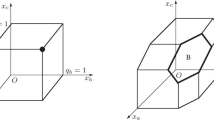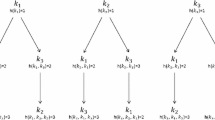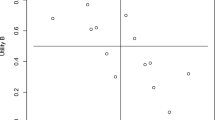Abstract
We consider the problem of assigning indivisible goods among a group of agents with lotteries when the preference profile is single-peaked. Unfortunately, even on this restricted domain of preferences, equal treatment of equals, stochastic dominance efficiency, and stochastic dominance strategy-proofness are incompatible.
Similar content being viewed by others
References
Abdulkadiroğlu A, Sönmez T (1998) Random serial dictatorship and the core from random endowments in house allocation problems. Econometrica 66: 689–701
Birkhoff G (1946) Three observations on linear algebra. Univ. Nac. Tucumán. Revista A.5: 147–151 (in Spanish)
Bogomolnaia A, Moulin H (2001) A new solution to the random assignment problem. J Econ Theory 100: 295–328
Bogomolnaia A, Moulin H (2002) A simple random assignment problem with a unique solution. Econ Theory 19: 623–635
Che Y-K, Kojima F (2010) Asymptotic equivalence of probabilistic serial and random priority mechanisms. Econometrica 78: 1625–1672
Crès H, Moulin H (2001) Scheduling with opting out: improving upon random priority. Oper Res 49: 565–577
Ehlers L, Klaus B (2003) Probabilistic assignments of identical indivisible objects and uniform probabilistic rules. Rev Econ Des 8: 249–268
Gibbard A (1977) Manipulation of schemes that mix voting with chance. Econometrica 45: 665–681
Hatsumi K, Serizawa S (2009) Coalitionally strategy-proof rules in allotment economies with homogeneous indivisible goods. Soc Choice Welf 33: 423–447
Heo E-J (2011) Probabilistic assignment problem with multiple demands: a generalization of the serial rule and a characterization, Mimeo
Hylland A, Zeckhauser R (1979) The efficient allocation of individuals to positions. J Political Econ 87: 293–314
Katta A-K, Sethuraman J (2006) A solution to the random assignment problem on the full preference domain. J Econ Theory 131: 231–250
Kojima F (2009) Random assignment of multiple indivisible objects. Math Soc Sci 57: 134–142
Kojima F, Manea M (2010) Incentives in the probabilistic serial mechanism. J Econ Theory 145: 106–123
Kureishi W, Mizukami H (2007) Equal probability for the best and the assignment of identical indivisible objects. Econ Bull 4: 1–10
Sasaki H (1997) Randomized uniform allocation mechanism and single-peaked preferences of indivisible good, Working Paper, Waseda University
Thomson W (2008) Strategy-proof allocation rules, Mimeo
von Neumann J (1953). A certain zero-sum two-person game equivalent to the optimal assignment problem. In: Kuhn HW, Tucker AW (eds) Contributions to the theory of games, vol 2. Princeton University press, Princeton, pp 5–12
Author information
Authors and Affiliations
Corresponding author
Rights and permissions
About this article
Cite this article
Kasajima, Y. Probabilistic assignment of indivisible goods with single-peaked preferences. Soc Choice Welf 41, 203–215 (2013). https://doi.org/10.1007/s00355-012-0674-2
Received:
Accepted:
Published:
Issue Date:
DOI: https://doi.org/10.1007/s00355-012-0674-2




